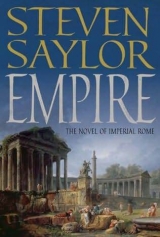
Текст книги "Empire"
Автор книги: Steven Saylor
Жанр:
Исторические приключения
сообщить о нарушении
Текущая страница: 38 (всего у книги 45 страниц)
For such an occasion, his son informed him, there must be a scurra among the guests; no memorable social occasion could take place among the elite of the city without a scurra to amuse them. Apparently there existed an entire class of such persons in the city, men who literally made their way by their wit. A scurra cadged dinner invitations to the homes of the wealthy and in return shared gossip, told jokes, injected double entendres into the conversation, flattered the host, and gently mocked the guests.
“And where on earth will I find such a person?” Lucius had asked his son, quite certain there were no scurras among the staid acolytes of the Teacher.
“Apollodorus says he’ll bring someone, a fellow named Favonius,” said Marcus. Apollodorus had also invited the director of the imperial archives, a man in his forties named Gaius Suetonius, who had learned that the elder Pinarius had known Nero and his long-vanished circle and was eager to meet him.
After many days of preparation, the appointed hour arrived. The guests appeared in quick succession and were shown to their dining couches. The house was filled with the steady hum of conversation and laughter.
The scurra showed his worth early on. Favonius had frizzled red hair, plump cheeks, and a peculiar nose that skewed to one side; from his protruding belly, it appeared that he loved food and seldom missed a meal. When it became evident that no meat would be served, Favonius pretended to pout. “I see we’re to be served a gladiators’ diet tonight: no meat, just barley and beans! Ah, well, thank the gods that gladiators are allowed to drink wine.” Both Lucius and Marcus were taken aback by the man’s rudeness, but everyone else laughed, and not another word was said all night about the lack of meat or fish; the scurra’s blatant complaint forestalled any further grumbling. Instead, the guests vied with one another to praise the cook’s skill and ingenuity.
Hadrian and Suetonius engaged Lucius in conversation. The archivist was curious to learn anything about Nero, while Hadrian wanted to know every detail of his host’s friendship with Apollonius of Tyana, Epictetus, and Dio of Prusa.
Marcus noticed that Apollodorus stayed largely out of the conversation. It seemed to him that there was some tension between the architect and Hadrian, who had always been on friendly terms.
Hadrian excused himself to go to the latrina. As soon as he was out of sight, the scurra grunted. “I do believe that fellow has lost his provincial accent entirely.”
“I was just thinking the same thing,” said Lucius. “When he first came to Roma, I seem to recall that his accent was quite pronounced.”
“You recall correctly,” said Favonius. “People still talk about the occasion, early in Trajan’s reign, when Hadrian read one of the emperor’s speeches aloud to the Senate, and the senators laughed out loud. Hadrian blushed so brightly you couldn’t even see his acne scars.”
“Hadrian’s worked very hard to get rid of his accent, and I think he’s succeeded,” said Suetonius, whose own diction was elegant to the point of pedantry.
Apollodorus, who was from Damascus and whose Latin had its own provincial accent, shook his head. “He now sounds so much like a city-born Roman that Trajan has stopped calling him the Little Greek. He calls him the Little Roman.”
Favonius tittered. “Oh, dear, I am going to have to steal that one from you.”
“It’s not a joke,” insisted Apollodorus, “it’s the truth!”
When Hadrian returned, the entire company fell silent. Hadrian took the opportunity to steer the conversation back to Dio of Prusa, whose latest writings had been much concerned with the subject of marriage. Happily restored to his native city, Dio also seemed to be quite happily married, and expressed his contentment by extolling the virtues of marital union above all other forms of love.
The topic cheered no one. Lucius Pinarius had known love, but never marriage. Apollodorus’s wife had been very ill lately, and thoughts of her only made him gloomy. Hadrian had been married for several years to Trajan’s grand-niece Sabina, but their marriage was childless and thought by many to be in name only. As for Marcus, his irregular origins, a subject never openly discussed by those who knew him but apparently known to all, had made it difficult for him to find a match suited to his family’s ancient name and patrician status; not yet married, and with no immediate prospects, he had given up thoughts of creating a family and devoted himself entirely to his work.
The scurra, seeing the gloominess caused by the subject, managed to crack a few crude jokes about marriage, but these seemed forced and stale. It was Suetonius who rescued the conversation. As a sidelight to his work as an archivist, he was a dedicated antiquarian and amateur historian, and kept a notebook dedicated especially to anecdotes about imperial marriages. He amused them at length with stories about the duel of wits between Livia and Augustus, Caligula’s so-called marriages to his sisters, Claudius’s misery with Messalina and his agony with Agrippina, and Nero’s marriage to the beautiful but ill-fated Poppaea, followed by his betrothal to her double, the equally ill-fated Sporus.
“You must have known Sporus,” said Suetonius, looking at their host.
Lucius made no answer for a long moment. “Yes, I did,” he finally said.
“Was the eunuch as beautiful as they say?” asked Hadrian.
“Yes, she was,” said Lucius, lowering his eyes. The others waited for him to elaborate, but instead he said, “Shall we retire to the garden? Carry your cups with you. I shall be serving a special wine from Samothrace with a jasmine flavour that emerges only under moonlight – so the merchant assured me.”
As they stepped into the garden, Hadrian came to a sudden halt. He stared at the statue of Melancomas. Marcus had noticed that visitors were often a bit startled by the image of the naked boxer, probably because it stood at ground level and was so extraordinarily realistic that a casual observer might mistake it for a living man. But Hadrian’s reaction went beyond mere surprise: his face was lit with wonder and delight. He reached out to touch the smooth marble of the statue’s face. A moment later, he stepped back and touched his own cheek, running his fingertips over the rough, mottled blemishes.
“Melancomas,” said Lucius.
“Yes, I’ve seen other images of him – but none that could match this one,” said Hadrian, unable to take his eyes from the statue. “They say Melancomas was beloved by the Divine Titus. Lucky Titus! If only, someday, I could meet a youth as beautiful as this…”
Marcus smiled. “If only, someday, I could create a statue as beautiful as this.”
Favonius stepped between them and tilted an eyebrow at each in turn. “May each of you be granted his desire – and be happy with it!”
Apollodorus joined them. He was a bit drunker than the rest. For Apollodorus, the evening was a rare break from months of unceasing labour, and he had imbibed a considerable quantity of the fine vintages on offer. Seeing that they were all gazing at the statue, he nodded. “Ah, the Melancomas. Superb! Without a doubt, the most beautiful and most valuable thing in the house.” He looked from Marcus to Hadrian. “Look at the two of you – spellbound! But for rather different reasons, I suspect. Which of you is truly Pygmalion, and which is the Little Greek? It seems to me that Marcus here is more the pure connoisseur, the Greekling who loves art for its own sake, and you, Hadrian, are the lover who longs to see a statue brought to life! Perhaps we should call you Pygmalion!”
Favonius laughed, but Marcus was not amused. Being called Pygmalion in private was one thing, but hearing his old slave name used in front of others rankled him. Nor was Hadrian amused: he looked quietly furious, and the acne scars across his cheeks turned bright red. Again, Marcus was puzzled by the tension between the two men.
Favonius, who missed nothing, saw the look on Marcus’s face and drew him aside. As they strolled to the far end of the garden, the scurra spoke in a low voice. “Are you not aware of the tiff between those two?”
Marcus wrinkled his brow. The scurra’s eyes lit up. There was nothing that gave Favonius greater pleasure than the chance to deliver fresh gossip. “Everyone’s talking about it! Where have you been the last couple of days?”
“Helping my father plan this party,” said Marcus.
“Ah! Then you haven’t heard about the meeting Caesar had with Apollodorus, about the reconstruction of the Greek wing of the library?”
“I know about that. It was two days ago.”
“But you weren’t there?”
“I won’t be involved until the time comes to decorate the interior.”
“I see.” The scurra nodded knowingly. “Well, it so happens that Hadrian did attend that meeting.”
“As he often does.”
“But this time he put forward some plans of his own.”
“What sort of plans?”
“Apollodorus was explaining to Caesar how long it will take to finish the repairs to the Greek wing, when Hadrian interrupted and proposed that the wing should have a dome on it – the man is crazy for domes – and produced some very elaborate drawings and plans which he insisted they both look at.”
“But such an idea isn’t possible. The Latin and Greek wings are intended to be symmetrical, and the Latin wing has no dome.”
“That’s exactly what Apollodorus said. Whereupon Hadrian said, ‘That’s why I propose to remodel the Latin wing and give it a dome as well.’ Apparently he has some idea that a dome is absolutely necessary for such a building, something about letting in light from the ceiling. He produced another drawing to show how the library would look if both wings had a dome, with the Column rising up between them, and apparently Trajan rather liked the notion.”
Marcus raised his eyebrows, thinking of all the time and effort such a scheme would entail. “How did Apollodorus react?”
“Apparently, he was absolutely scathing. You know he’s not afraid to be outspoken when it comes to such things. Even as Hadrian was expounding on the beauty of his domes, Apollodorus pointed at the drawings and turned up his nose. ‘What are these supposed to look like,’ he said, ‘two swollen testes flanking the upright Column?’ Well, once that image is in your mind, you can’t picture it any other way, can you? ‘These bulbous monstrosities not only spoil the overall symmetry of the whole forum,’ he says, ‘but they’ll collapse even before they’re completed.’ To which Hadrian made some crack about that unfortunate business with the broken crane, whereupon Apollodorus looked him straight in the eyes and said, ‘It’s one thing to draw your fantasy, young man, another to actually build it. Be off, now, and draw your giant gourds elsewhere. Caesar and I have a lot to talk about, and you understand nothing of these matters.”
“Trajan let him speak that way to his own cousin?”
“The emperor gives Apollodorus a very long leash, as you know, at least in matters to do with art and architecture. He trusts his judgement implicitly, whereas Hadrian, when all is said and done, is still the Little Greek, an over-educated dabbler who would do better to concentrate on his military career and leave art to the hirelings who create it for the pleasure of their betters. Hadrian was crushed. He gathered up his precious drawings and stalked off, practically in tears. Oh dear, but now we’ve come full circle, and there they are, still staring at that statue and not saying a word to each other.”
Marcus tried to think of a new topic for discussion. “What word, Hadrian, about this expedition being mounted by the emperor against Parthia?”
The question seemed to draw Hadrian out of a trance. He smiled. “I’m to go with him. It seems I’ll finally see the cities of the East – perhaps even Ctesiphon.”
He alluded to the capital of Parthia. Not content with the conquest of Dacia, Trajan had been seized by an even grander conceit – to fulfill the repeatedly thwarted Roman ambition that went back to the days of Julius Caesar, to follow in the footsteps of Alexander the Great and expand Roma’s empire eastward into the realms of ancient Persia.
Lucius Pinarius, who had joined his guests in the garden, cleared his throat. “Of course, there’s no real strategic purpose for inciting such a war, except that the Parthians present the only empire in the world to rival that of Roma.”
“I should think there’s every reason to conquer them,” said Favonius. “Or rather, the only reason there ever is for a war – wealth to plunder. The Dacians were the last neighbour left on the edges of the empire who actually possessed anything worth taking. Beyond our provinces on the northern coast of Africa lies a trackless desert; beyond Egypt lies a land of savage troglodytes and impassable jungles; the northern part of the island of Britannia is a frigid wasteland; and the realms beyond Germania and Dacia seem to be completely uncivilized, inhabited by such foul barbarians that they’re not even worth taking as slaves. There is India, of course, and beyond that the kingdom of Serica, the land of silk, which surely must be wealthy, but the world beyond the Indus River is so remote that hardly any Roman has ever traveled there, except for a few intrepid merchants. Within our reach, only Parthia and its satellite kingdoms remain to be conquered – and the wealth of its empire must be staggering.”
“As will be the challenge of taking it,” said Hadrian. “Even the Flavians at their most ambitious never dreamed of such a thing. But Caesar is ready for the challenge.”
“You won’t be going, will you, Marcus?” said Lucius, with a slight quaver in his voice.
“No, father. The emperor has decided that Apollodorus and I should remain here in Roma.”
Apollodorus nodded. “I’m compiling a handbook of designs for siege engines and such for the emperor to take with him, and training some of my best engineers for the expedition. But there’s still a great deal of work to be done on Caesar’s grand building projects here in the city, and whom could he possibly leave in charge but myself? Naturally, he looks to someone with experience, someone who knows how to get things done in strict accordance with his own high standards.” His boasting seemed to Marcus a deliberate attempt to needle Hadrian. After another swallow of wine, Apollodorus spoke to Hadrian directly. “But while Pygmalion and I stay here in the city to finish the projects, I’m sure you’ll manage to kill a Parthian or two, Little Greek! And like every conqueror, you’ll find it’s easier to demolish buildings and strip their ornaments than to put one up in the first place.”
Hadrian blushed furiously. Apollodorus laughed and held out his cup for more wine. Did he not realize how deeply he had offended Hadrian? Did he not care?
Lucius stepped forward. “Caesar shows great trust to keep you here in Roma, Apollodorus. And you must have great trust in Marcus, to keep him here with you.”
“No one else has the skill to finish the interior decorations of the Greek wing of the library, for one thing,” said Apollodorus, looking askance at Hadrian.
“I’m gratified to hear you say that,” said Lucius, “because, as our evening together draws to a close, I wish to remind you of the reason for this occasion: to honour my son for all he’s accomplished in recent months. I ask you to drink a toast. Raise your cups, please. To Marcus Pinarius – the best son a man could ever hope for.”
“To Marcus Pinarius!” said the rest, except for Apollodorus, who shouted, sounding quite drunk, “To Pygmalion!”
As soon as the toast was finished, Hilarion entered and spoke in Lucius’s ear. Lucius hurried to Apollodorus. “Your daughter is in the vestibule,” he said quietly. “Hilarion invited her to the garden, but she wouldn’t come. Apparently she’s quite upset. Your wife has taken a turn for the worse.”
Apollodorus, looking suddenly sober, drew a deep breath and left them without a word.
The guests began to amble out of the garden, until no one was left except Marcus and Hadrian, who stood gazing at the statue of Melancomas and rubbing his chin. Marcus interpreted the gesture to mean that Hadrian was brooding or lost in thought, then realized that the man was once again touching the acne scars that disfigured his otherwise handsome face.
While the guests said their farewells to his father, Marcus proceeded to the vestibule, where Apollodorus was having a hushed conversation with his daughter. Marcus had met Apollodora when he first began working for her father. She had been a mere child then. He had not seen her since.
As Hilarion opened the door for Apollodorus and his daughter to make their exit, Apollodora looked back at Marcus for a moment. He was startled to see what a beauty she had grown into, with her lustrous dark hair, shimmering skin, and enormous eyes.
Later, when he went to bed, Marcus fell asleep thinking about her.
Lucius Pinarius claimed that wine disturbed sleep, and that this was yet another reason to avoid it; perhaps it was the wine that caused Marcus’s strange dreams that night.
His pleasant thoughts about Apollodorus’s daughter vanished as he fell asleep. He was back in Dacia. A village was in flames. As if he were a bird, he followed a boy with unkempt hair and ragged clothes who ran through the narrow streets. Laughing and making obscene noises, Roman soldiers pursued him. The boy tripped over a dead body, threaded his way through jumbled ruins, leaped over raging flames. Suddenly he reached a dead end. He was trapped. He screamed, but there were plenty of other people screaming in the village; he was just one more.
Suddenly, Marcus became the boy. The soldiers converged on him. He was tiny, and they were huge, looming above him in darkness so that he could not see their faces. A giant hand reached for him…
Marcus had experienced this dream before, or dreams much like it. Always, this was the point at which he would awaken, shivering and covered with sweat. But this time he seemed to fall even deeper into the dream. The leering soldiers vanished, as did the ruins of the village. All was suffused with a golden light. Hovering before him was a beautiful, naked youth. He reminded Marcus of the statue of Melancomas, but this being was so radiantly beautiful that he seemed more than human. Was he a god? The youth regarded him with an expression of such tenderness and compassion that Marcus was suddenly close to tears.
The youth reached towards him. He whispered, “Do not fear. I will save you.”
Then Marcus woke.
His room was lit by the first faint glow of dawn. He reached for the coverlet he had thrown off during his nightmare and pulled it to his chin. The warmth comforted him, but it was the lingering impression of the dream that filled him with an exquisite sense of well-being. He had never experienced such a feeling before, a certainty that somewhere in the universe there existed a power that was perfect and loving, that would shield him from all evil in the world.
Who was the divine youth of his dream? There had been nothing to identify him as one of the familiar gods of Olympus. Was he Apollonius of Tyana, who often visited Marcus’s father in dreams? Marcus didn’t think so; surely Apollonius would have shown himself as Marcus had always heard him described, an old man with a white beard. Was he a manifestation of the Divine Singularity, of which Marcus’s father spoke? Perhaps. But it seemed to Marcus that the youth in his dream was a completely new being, never before seen by anyone in this world. He had shown himself to Marcus and to Marcus alone.
As the afterglow of the dream began to fade, Marcus tried to remember the face of the youth – he even tried to draw him, reaching for the stylus and wax tablet he kept at his bedside, but he found it impossible to recapture the features. The face Marcus drew was only a rough approximation that gave no hint of his unearthly perfection.
Perhaps the youth was nothing more than a creation of Marcus’s imagination. And yet, the dream had seemed more real than waking life. Marcus was convinced that this being came from a place outside himself, a world that was unimaginably vast and beautiful and full of wonder.



![Книга Империя атома / Empire of the Atom [= Мутант] автора Альфред Элтон Ван Вогт](http://itexts.net/files/books/110/oblozhka-knigi-imperiya-atoma-empire-of-the-atom-mutant-148051.jpg)




